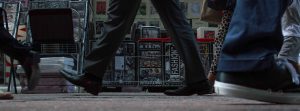 JPMorgan executives tasked with managing the bank’s precious metal investing are now the target of an extremely aggressive investigation in which some of these executives are being charged under RICO. Federal prosecutors agreed that the move was aggressive and rarely used in banking conspiracy cases, but also noted that the alleged price-fixing and racketeering occurred over eight years. JPMorgan pleaded guilty to price-fixing and the major players, at least the ones who were caught, now face serious criminal charges.
JPMorgan executives tasked with managing the bank’s precious metal investing are now the target of an extremely aggressive investigation in which some of these executives are being charged under RICO. Federal prosecutors agreed that the move was aggressive and rarely used in banking conspiracy cases, but also noted that the alleged price-fixing and racketeering occurred over eight years. JPMorgan pleaded guilty to price-fixing and the major players, at least the ones who were caught, now face serious criminal charges.
Prosecutors also allege that Michael Nowak, the main player in the federal investigation, ripped off market participants and clients in order to control the prices of gold, platinum, silver, and palladium. Two other traders were charged, as well.
Spoofing
 Chicago Criminal Lawyer Blog
Chicago Criminal Lawyer Blog










